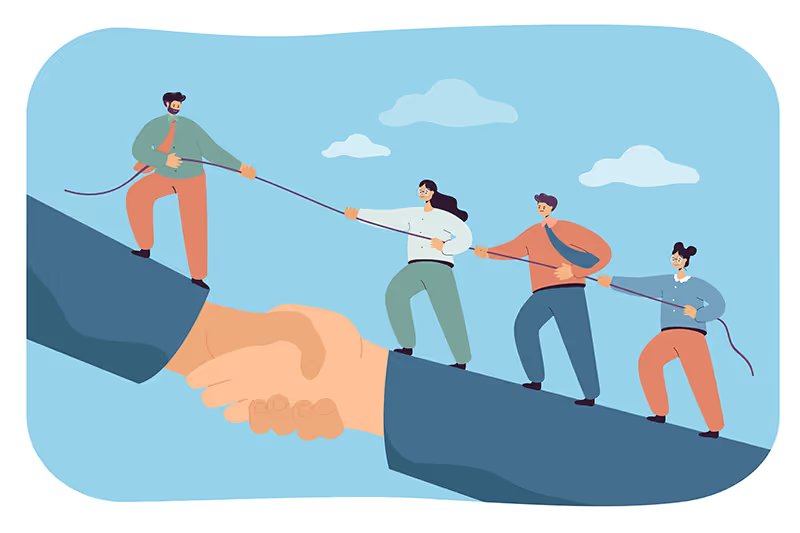If you could wave a magic wand and make everyone in your organization do three things in a crisis, what would they be? Should they be more adaptable? Be more focused? Work together?
Every leader should ask themselves that question. And once they can answer it, they should ask themselves another one: Can your people actually remember and apply these critical habits under pressure?
This exercise underscores an important insight about habits: If they aren’t easily recallable under stress, they aren’t useful. Conversely, habits that stick in our minds are referred to and practiced with regularity, even under duress (think “stop, drop, and roll”).
Organizations can apply this knowledge to any behavior change initiative. Science-backed strategies can help organizations embed strong habits at scale—habits that people can recall and apply consistently, even under pressure. No wand necessary. Here’s how.
Moving from exhaustive to essential
Too often when organizations attempt to instill new habits they err on the side of exhaustive, not essential. Conventional wisdom tells us to include everything—every possible scenario, contingency, and outcome—especially if we operate in a highly regulated industry.
The result is an encyclopedic list of behaviors that is summarily relegated to the back of the bottom drawer, never to be referred to again, much less in a crisis. Ultimately it’s forgotten or abandoned not due to a lack of information, but due to our limited ability to remember it all.
But what if you could fit the behaviors on a sticky note and stick it to your monitor? What if they were so memorable that you didn’t even need the sticky note? This is the standard of simplicity you should strive for, and that science suggests is optimal if we want people to actually change their behavior.
This is because our minds have limits—a concept known as cognitive capacity, which is described in NeuroLeadership Institute’s FACT Model™. The FACT Model™ can help us understand our minds’ limits, and design behaviors that work within them. Specifically, we can attend to the factors of Fluency, Amount, Coherence, and Time to enhance understanding, retention, and recall.
Reaching easy recall under pressure
Once you’ve established the behaviors you wish to embed, and optimized them for retention and recall using the FACT Model™, you should understand than when learning a new behavior our brains undergo a learning journey from recognition, to recalling with effort, to recalling easily, and finally, to recalling easily under pressure.
Take, for example, learning to tie your shoes. It was easy to recognize how to fasten your velcro straps, however, this isn’t the case when looking at loose laces. You needed to recall the steps it takes to turn untied laces into a neat bow, at first this takes effort. After some instruction, you were able to tie your sneakers, probably reciting a rhyme to help you along the way. Once you had the hang of it, you may have been able to tie your shoes without considering each step in the process, but still with conscious effort—a place of easy recall.
Finally, when you tied your shoes this morning (if you’re not still wearing slippers) you did it semi-unconsciously. In fact, even if you were running out the door, late for an appointment, with your cell phone buzzing in your pocket, and the dog barking, you could probably tie your shoes without a second thought, or even a first for that matter. In other words, you could recall it easily under pressure.
In the organizational setting, let’s unpack the example of building inclusive behaviors. When you were first introduced to the concept of inclusion, you may not even have realized that often we unintentionally exclude people. You start by simply recognizing the necessity, and benefits, of being more inclusive.
After you’ve received some education on the subject and training on the associated practices, you may need to remind yourself during meetings to speak last as a leader or use parallel processing to gather diverse perspectives—in other words, you’re recalling the behaviors with effort.
Once you’ve had some practice, we begin to incorporate inclusive practices into more facets of our day to day—having reached a place of easy recall. And, once the practices have become part of your routine, you begin to rely on them, even under pressure, having reached a place of easy recall under pressure.
Applying the science
We can, and should, apply this science to every habit we attempt to cultivate in the workplace. Your leadership principles, bias mitigation strategies, and inclusive practices should be simple enough that people can remember and use them when they’re pressed for time, distracted, or overwhelmed (or all three).
NLI has partnered with organizations like Microsoft to deliver this cognitive simplicity and real-world utility. In fact, each of NLI’s solutions is designed with this in mind. By distilling large bodies of scientific research into simple habits that are easily recalled and applied in the flow of work, we’ve helped organizations achieve massive behavioral change. The key is to apply the science of learning.




.avif)



